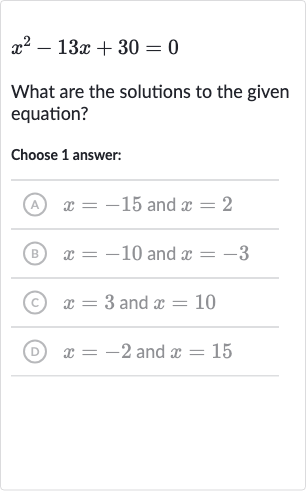Full solution
Q. What are the solutions to the given equation?Choose answer:(A) and (B) and (C) and (D) and
- Given equation: The given equation is a quadratic equation of the form . We need to find the values of that satisfy the equation . To do this, we can factor the quadratic if possible.
- Factoring the quadratic: We look for two numbers that multiply to give the constant term, , and add up to give the coefficient of the term, . The numbers that satisfy these conditions are and because and .
- Setting up the equations: We can now factor the quadratic equation as .
- Solving the first equation: To find the solutions, we set each factor equal to zero and solve for x. This gives us two equations: and .
- Solving the second equation: Solving the first equation, , we get .
- Solution to the quadratic equation: Solving the second equation, , we get .
- Solution to the quadratic equation: Solving the second equation, , we get . We have found the two solutions to the quadratic equation: and . These are the values of that satisfy the equation .
More problems from Compare linear and exponential growth
QuestionGet tutor help
QuestionGet tutor help
QuestionGet tutor help
QuestionGet tutor help
QuestionGet tutor help
QuestionGet tutor help
QuestionGet tutor help

